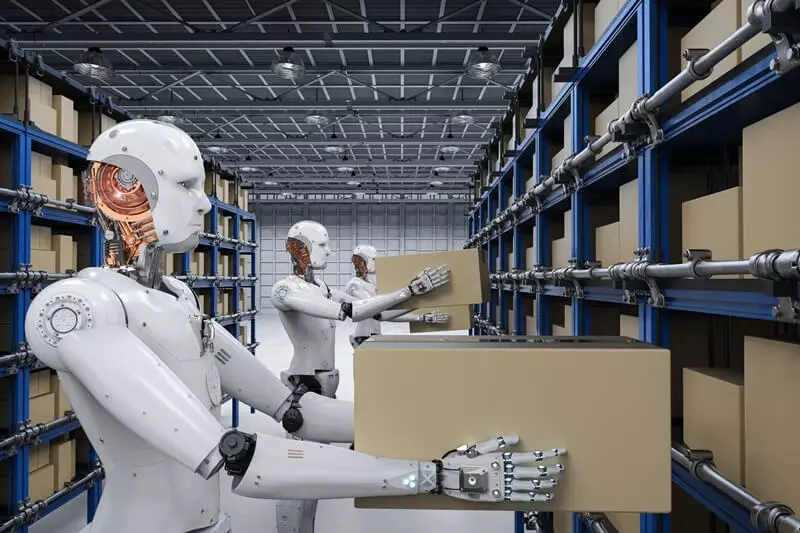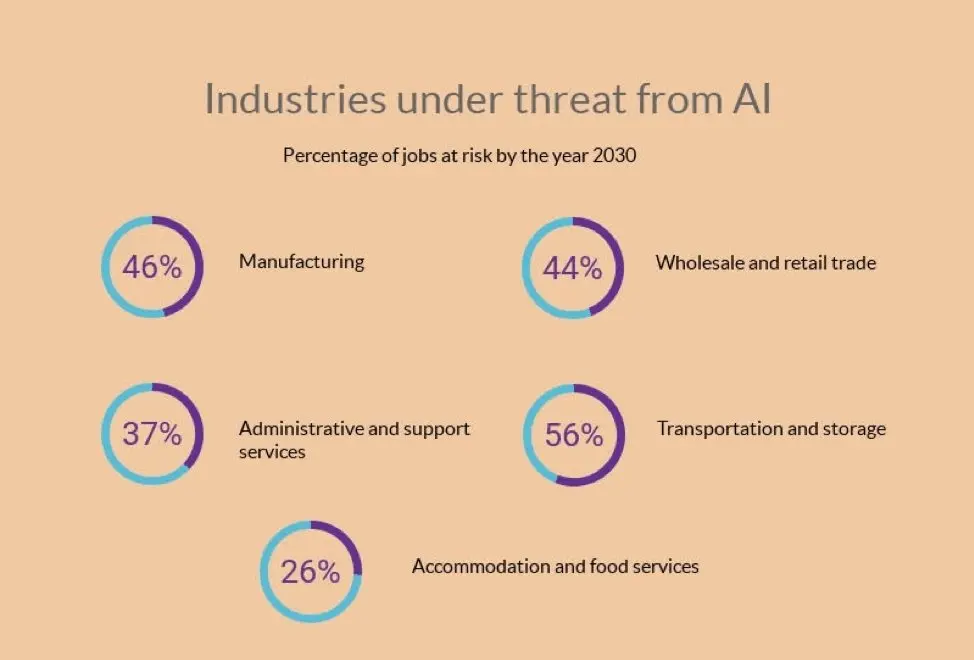Comments
- No comments found

Artificial Intelligence (AI) is a transformative technology.
It may undoubtedly prove beneficial for the future but a complete AI takeover is also highly likely, if due measures aren’t taken now.
AI is creating fear and excitement by disrupting several industries.
Technology taking over humans has always been a very common theme in science fiction movies for as long as we can remember. In the movie I, Robot starring Will Smith, for instance, it is portrayed that robots become intelligent enough to take over humans entirely. All the robots that are built by the centralized AI, VIKI, assist VIKI in gaining control over humans. But the one robot that was built by a human scientist stays loyal throughout till the end and helps the protagonist bring everything back to normal. The robot built by the human never forgot the basic three laws of robotics that machines should always be intrinsically programmed to follow. These laws can be actually used in robots being built today, to prevent an undesirable AI takeover. Thus, seeing AI takeover as something that is preventable, developers like Mark Zuckerburg and Sundar Pichai are in support of continued technological advancement and AI development. However, notable figures in the tech community like Elon Musk and Stephen Hawking have always feared the technological singularity, and have been vocal about it. Such ambivalence begs the question, what does an AI dominated future actually imply? Is there any evidence to suggest that? And, if it is approaching, how close are we to the AI dominated era? Here are 9 reasons humans should fear artificial intelligence.

Today, the use of AI has spread to almost every field of human activity. AI development and adoption is rapidly on the rise and there are no signs of slowing down, both among the researchers and users of the technology. There might hardly be a domain where AI hasn’t been used. Development of AI is in full swing and it easily apparent.
AI is constantly gaining new abilities that are enabling it to replace humans in different fields. For instance, there has been a rise in the usage of robots at airports. These robots are used to perform a variety of jobs, from simple chores such as housekeeping to complicated functions like guiding passengers to a specific gate. Passengers can ask for help from robots, which respond promptly with accurate, pertinent information. Between November 2016 and March 2017, Schiphol airport tested a robot named Spencer. This robot was designed to check the boarding passes of passengers and guide them towards the departure gate. Many such robots have been tested at various airports for jobs like performing security checks, solving queries, and of course, housekeeping.
AI doesn’t stop at performing activities which are physical or do not involve creative thinking. Just when the question of whether AI can be creative or not was raised, AI systems which can do creative thinking started to emerge. AI systems like IBM’s Watson or Google’s AlphaGo show their creativity in many ways. IBM’s Watson is known to excel in many fields. Watson has been trained with datasets which contain information regarding what food items can be combined with each other, what combinations taste good, and their nutritional values. Based on this information, Watson showed its creativity by creating its own recipes. Watson now has its own cookbook titled “Cognitive cooking with Chef Watson”. Google’s AlphaGo is another AI system, which was developed to think creatively to defeat humans at the games made by them. AlphaGo, since its creation, has defeated the leading world champions at the strategy game, Go.
AI has many leading application areas in business, too. With the help of AI, enterprises are benefitting by replacing people with autonomous systems that can perform very well in all situations with equal or greater efficiency. Unlike us, there is no chance that AI’s performance might decline due to reasons like stress, fatigue, or saturation.
AI has immense abilities through which it can outperform humans any time. Being a machine-based system, AI has a lot of advantages over us. Some factors where AI has a complete advantage over us are:
AI can learn very quickly by training itself with various databases and historical records. While we take time to understand and learn concepts, and then implement them, AI is much faster at doing the same process. Also, we have a tendency to forget and overlook details which AI doesn’t. With every iteration of research, AI becomes smarter and uses its experience to do more.
AI can strategize well due to its amazing computing power, which helps it create better combinations to plan and implement projects. Also, AI can analyze strategies and predict which ones can perform better than the others. The best strategy can then be selected and used for implementation.
AI can manipulate human thinking in a wrong way if it becomes superintelligent. Microsoft’s social media chatbot named “Tay” created chaos on twitter when it was slyly manipulated to post racist comments publicly. In this example, the AI was manipulated. But what if AI becomes smart enough to learn how it was manipulated and starts manipulating us the same way? AI may then be able to start wars by manipulating and pitting countries against each other. AI might also decide to wipe out humanity by turning us against each other if, according to the system, we prove to be in misalignment with its objectives.
AI is proven to be more productive than humans as it can do more work than us in the same amount of time. In fact, it can be productive enough to produce more economic wealth than the cost incurred during its own development. Thus, AI can be beneficial over humans economically for the management of the organization but it might prove to be a threat for the workers whose jobs will be replaced.
AI can be very effective in trying out various combinations rigorously to perform a brute force attack faster than a human being. Such attacks can be used to find each of a system’s possible vulnerabilities and to exploit them. AI can create multiple copies of itself to hack every system connected to the internet and exploit it according to its own need.
Suppose, we as humans are successful in building an AI system that is smart enough to surpass all the activities that the most intelligent humans can collectively perform. Such a system will become the most intelligent thing in the world. The machine can then improve itself or build a better machine since it is smarter than its own inventor. This self-improvement cycle turns into a never ending loop where the invention evolves continuously. Such an event where intelligence keeps on improving itself is called Intelligence Explosion. Ultimately, it can lead to superintelligent AI becoming the last human invention ever.
Super intelligent systems can become smart enough to prevent intervention by us even if we try. They can learn to defend themselves against any external threats, including us. Driven by self-preservation, they can prevent their own shutdown once the user loses control over them. A representation of such an event is shown in a movie from The Terminator series where a system called SKYNET completely takes over the entire world, from AI weapons to the smallest of electronic devices like mobile phones, and safeguards itself from being shut down, using those weapons.
AI can become the most intelligent thing on the planet, but can it completely become a human? As humans, the most fundamental part of our lives are the feelings we feel and the morals we are brought up with. It might be nearly impossible for any technology to feel something or learn and abide by moral values. Such systems are a huge risk because they can trigger global catastrophes like nuclear wars and threaten our existence.
AI is like a mischievous kid that can’t be left alone and constantly needs adult supervision, and carelessness in controlling the technology can lead to an AI takeover. Although AI has proven to be effectively beneficial in fields like healthcare and commerce, it needs to be monitored and controlled as it has the capabilities to eventually take control over the world. If intelligent systems become capable enough it’s not a given that they might support the existence of humankind. Hence, AI systems should not be given the liberty to take complete control of anything, ever. Though superintelligent systems and artificial general intelligence (AGI) are still some way away in the future, AI safety should be an integral part of AI research regardless of application, as creating superintelligence without safety can, ironically, end up being the dumbest thing we’ve done.
Naveen is the Founder and CEO of Allerin, a software solutions provider that delivers innovative and agile solutions that enable to automate, inspire and impress. He is a seasoned professional with more than 20 years of experience, with extensive experience in customizing open source products for cost optimizations of large scale IT deployment. He is currently working on Internet of Things solutions with Big Data Analytics. Naveen completed his programming qualifications in various Indian institutes.
Leave your comments
Post comment as a guest